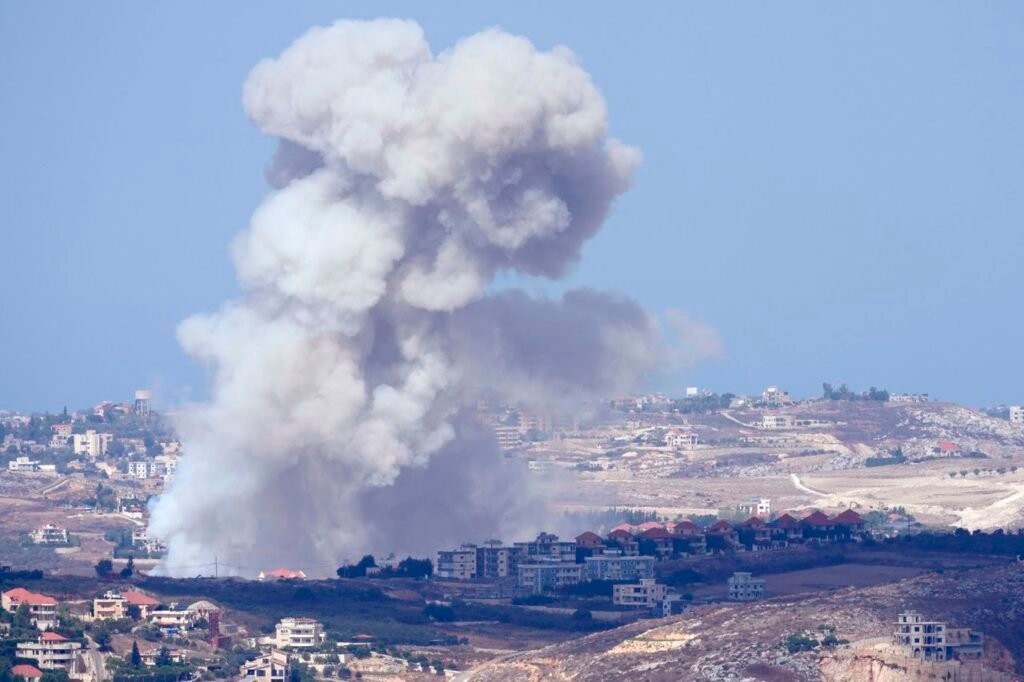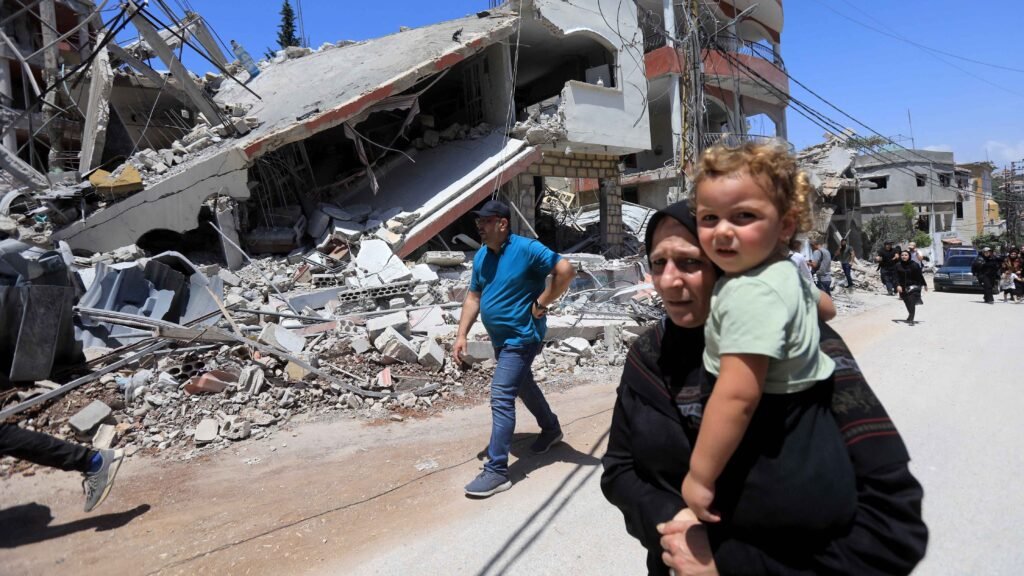
A devastating series of Israeli airstrikes has left Lebanon reeling, with at least 492 people killed and over 1,650 injured in the latest escalation of tensions between Israel and Hezbollah.
.The situation in Lebanon continues to deteriorate as Israeli airstrikes targeted Hezbollah strongholds, resulting in a significant loss of life and widespread destruction targeting the southern and eastern regions of the country, as well as the southern suburbs of Beirut.
The Lebanese Health Ministry has verified the staggering death toll, resulting from Israel’s latest airstrikes. However, officials warn that these numbers may escalate as additional information emerges from the impacted regions.
These airstrikes represent a significant escalation in Israel’s ongoing military campaign against Hezbollah, a militant organization locked in persistent clashes with Israeli forces since Hamas’s October 7 attack.
The intensified Israeli offensive aims to weaken Hezbollah’s capabilities and deter future attacks. Nevertheless, concerns mount regarding civilian casualties and humanitarian crises in affected areas.
Israeli Defense Minister Declares Significant Blow to Hezbollah, Vows Continued Pressure
In a bold statement, Israeli Defense Minister Yoav Gallant announced that Monday’s airstrikes in Lebanon have obliterated tens of thousands of Hezbollah rockets, dealing the Iranian-backed group its most severe blow since its inception.
Gallant underscored Israel’s unwavering commitment to drastically diminishing Hezbollah’s military prowess, a paramount objective of the ongoing campaign.
“We have inflicted unprecedented damage on Hezbollah’s arsenal, severely crippling their capabilities,” Gallant stated. “Our resolve remains unshakeable: to protect Israeli citizens by dismantling Hezbollah’s military might.”
In a statement to the public, Gallant urged Israeli citizens to remain calm and compliant with home front defense guidelines as military operations against Hezbollah are expected to expand. He also briefed US Defense Secretary Lloyd Austin on the situation overnight, discussing Hezbollah threats and broader regional concerns involving Iran and its proxies.
Netanyahu Vows to Deter Hezbollah, Urges Citizens’ Vigilance Amid Ongoing Conflict
Breaking his silence since the onset of hostilities, Israeli Prime Minister Benjamin Netanyahu delivered a resolute address, reaffirming his government’s unwavering commitment to recalibrating the regional balance of power.
Netanyahu pledged to relentlessly target Hezbollah’s missile and rocket capabilities, aiming to significantly degrade the militant group’s military potency.
“We will not relent in our mission to neutralize Hezbollah’s arsenal and restore security to our northern borders,” Netanyahu emphasized.
Citing the complexity of the situation, the Prime Minister cautioned Israelis to prepare for challenging days ahead, stressing the importance of adhering to safety guidelines and instructions from authorities.
The Israeli military has identified Beirut as a target, though specific details regarding future strikes remain unclear. The attack on Dahieh is the latest in a series of assaults on Hezbollah positions across Lebanon, raising concerns of further escalation in the Lebanese capital.
The United Nations peacekeeping force in Lebanon, (UNIFIL), has sounded the alarm, expressing “grave concern” for the safety of civilians in southern Lebanon.
This comes amid an intense Israeli bombing campaign, the likes of which haven’t been seen since last October. The situation is dire, and UNIFIL is urging both sides to de-escalate and take immediate action to protect civilians from further harm.
UNIFIL’s Head of Mission and Force Commander, Lt. Gen. Aroldo Lázaro, has been working tirelessly to reduce tensions, making contact with both Lebanese and Israeli parties to emphasize the urgent need for calm.
The international community is watching with bated breath, hoping for a resolution that prioritizes the safety and well-being of innocent civilians.
Lebanon Scrambles to Provide Relief as Airstrikes Displace Thousands
As Israel’s bombing campaign intensifies, Lebanon struggles to cope with the escalating humanitarian crisis. With no end in sight, the Lebanese government has swiftly converted schools in Beirut, Tripoli, and other regions into emergency shelters to provide refuge for the swelling ranks of displaced citizens.
Chaos grips the nation as panicked residents flee bombarded areas, overwhelming already-strained infrastructure and resources. Desperate families seek safety, crowding into makeshift shelters and stretching the country’s ability to respond.

Key Developments:-
• Schools transformed into emergency shelters to accommodate displaced populations
• Widespread disruption and panic as residents flee bombing
• Humanitarian crisis deepens, with thousands forced from their homes
• Government scrambles to provide aid and support
Scenes of Desperation:-
• Overcrowded shelters struggle to meet basic needs
• Families separated in the chaos, searching for loved ones
• Essential services disrupted, exacerbating hardship
• International aid appeals intensify as crisis worsens
As the situation spirals out of control, the international community must rally to support Lebanon’s relief efforts and protect innocent civilians caught in the crossfire.
In a related development, the United States criticized Israel’s recent raid on the Al Jazeera office in Ramallah, in the occupied West Bank. Israeli forces shut down the network’s office and issued a 45-day closure order, drawing rebuke from Washington, which described the action as “inconsistent with US support for freedom of the press.”
The situation in the Middle East is escalating rapidly, with Israeli airstrikes targeting Baalbek in the Beqaa Valley, sparking fears of an all-out war. Residents in the area were warned to evacuate before the airstrikes began, but the full extent of the damage remains unclear.
This latest wave of attacks marks a significant escalation in Israel’s campaign against Hezbollah, and concerns are growing that it could spill into a broader conflict, destabilizing the already volatile region.
Senior United Nations officials have called for an immediate and unconditional ceasefire, urging both Hezbollah and Israel to prioritize the safety of civilians. In a statement issued ahead of the UN General Assembly meeting in New York, officials stated: “These atrocities must end,” and called for the release of all hostages and arbitrarily detained individuals.
Lebanon Teeters on Brink as Conflict Rages On
Defying global pleas for calm, the crisis in Lebanon persists, with no end in sight. As Israel reaffirms its commitment to dismantling Hezbollah’s military apparatus, Lebanon steels itself for additional strikes, plunging the nation into deeper uncertainty.
No Reprieve in Sight
The international community’s urgent appeals for a ceasefire have fallen on deaf ears, leaving Lebanon’s civilians vulnerable to escalating violence. With Israel determined to degrade Hezbollah’s capabilities, the prospect of a prolonged and devastating conflict looms large.
Humanitarian Toll Mounts
The unrelenting bombardment has exacted a staggering humanitarian cost, displacing tens of thousands and claiming hundreds of lives. Lebanon’s infrastructure, already fragile, teeters on the brink of collapse.

Regional Stability at Risk
The conflict’s potential to draw in neighboring countries and ignite a broader regional conflagration grows more alarming by the day. The international community must intensify diplomatic efforts to prevent catastrophic escalation.
Lebanon’s Plea
As the nation struggles to survive, its people implore the world to act. The time for decisive action is now – to broker peace, safeguard innocent lives, and restore stability to a region on the precipice.


